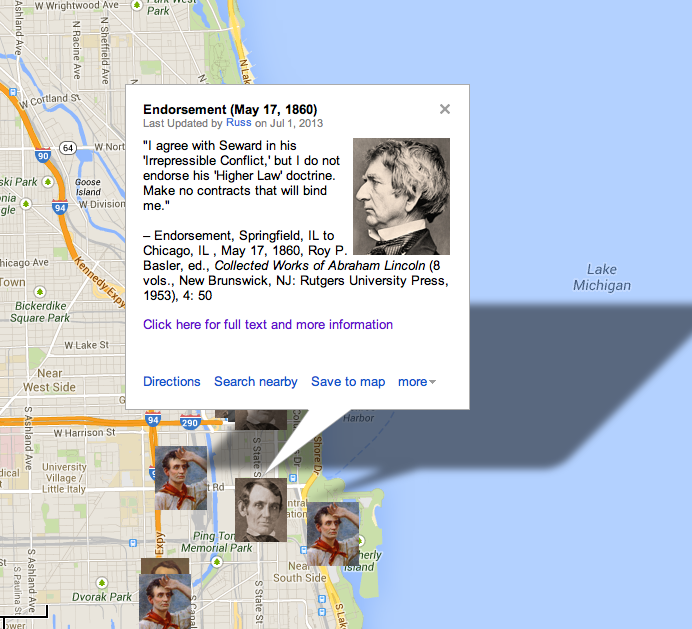Ranking
#142 on the list of 150 Most Teachable Lincoln Documents
Annotated Transcript
On This Date
Custom Map
How Historians Interpret
“Davis wanted to cut a deal with the Pennsylvanians, but the previous day Lincoln had sent a terse message via Edward L. Baker: ‘Make no contracts that will bind me.’ According to Henry C. Whitney, Baker ‘related that when he read the note to the delegates and workers gathered at the Lincoln headquarters he was greeted with a burst of laughter.’ Davis, who guffawed louder than anyone else, said: ‘Lincoln ain’t here, and don’t know what we have to meet, so we will go ahead, as if we hadn’t heard from him, and he must ratify it.’ Davis and Swett negotiated with the leading Cameron operatives, John P. Sanderson and Joseph Casey, ‘in the wee small hours of Friday morning.’ Before the convention met, Sanderson had predicted that Lincoln, unlike other contenders, might be able to carry the Keystone State. Cameron was allegedly offered a cabinet post in return for the votes of the Pennsylvania delegates on the second ballot. The Cameron representatives, wary because their counterparts had no authorization from Lincoln to act, were reassured that the Rail-splitter would never repudiate a promise they made.”
–Michael Burlingame, Abraham Lincoln: A Life (2 volumes, originally published by Johns Hopkins University Press, 2008) Unedited Manuscript by Chapter, Lincoln Studies Center, Volume 1, Chapter 15 (PDF), 1681-1682.
“All through the feverish night of May 17-18 the Illinois politicos worked to line up scattered second-ballot support for Lincoln. Despite the latter’s injunction from Springfield to ‘make no contracts that will bind me,’ his lieutenants in Chicago probably promised cabinet posts and other patronage plums to Indianans, to Cameron of Pennsylvania, and perhaps to the Blairs of Maryland and Missouri. How important these pledges were in winning votes is debatable – after all, Weed could make similar promises on Seward’s behalf. The belief that Lincoln could carry the lower North and Seward could not was the most powerful Lincoln weapon. And delegates from other states were influenced by the action of Indiana and Pennsylvania because they know that the party must capture them to win.”
— James M. McPherson, Battle Cry of Freedom: The Civil War Era (New York: Oxford University Press, 1988), 219.
“Lincoln remained in Springfield during the Republican national convention. People passing through town on their way to Chicago stopped to chat with him. He presented himself as a moderate candidate, while Seward represented the extreme antislavery faction. Edward L. Baker, editor of the Illinois State Journal, also stopped on his way to Chicago. He carried a copy of the Missouri Democrat containing Seward’s position on slavery. In the margin of the Democrat Lincoln wrote, “I agree with Seward in his ‘Irrepressible Conflict,’ but I do not endorse his ‘Higher Law’ doctrine.” That message was for Baker to print, but Lincoln added another message, this one for his managers in Chicago. Well aware of Davis and Swett’s penchants for bargaining, Lincoln added with an underlined emphasis, ‘Make no contracts that will bind me,’ and he instructed Baker to make sure Davis and Swett read the message. The extent to which Lincoln’s handlers adhered to this instruction produced a ripple effect that transcended the outcome of the convention.”
— Chester G. Hearn, Lincoln, the Cabinet and the Generals (Baton Rouge: Louisiana State University Press, 2010), 11.
NOTE TO READERS
This page is under construction and will be developed further by students in the new “Understanding Lincoln” online course sponsored by the House Divided Project at Dickinson College and the Gilder Lehrman Institute of American History. To find out more about the course and to see some of our videotaped class sessions, including virtual field trips to Ford’s Theatre and Gettysburg, please visit our Livestream page at http://new.livestream.com/gilderlehrman/lincoln
Searchable Text
I agree with Seward in his “Irrepressible Conflict,” but I do not endorse his “Higher Law” doctrine. Make no contracts that will bind me.

